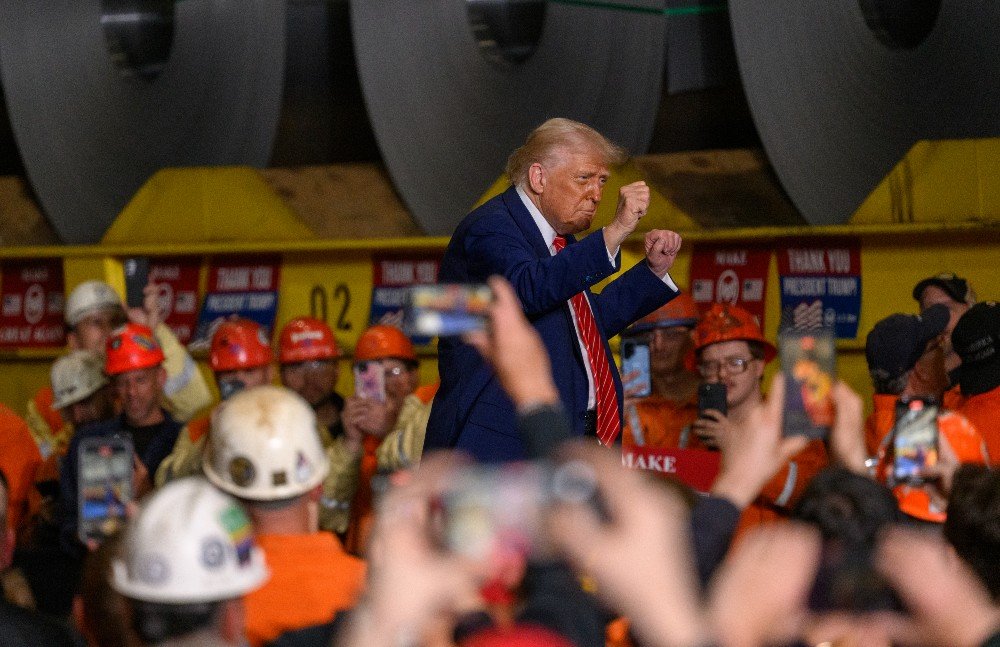
President Donald Trump signed an executive order Tuesday doubling global tariffs on steel and aluminum from across the globe.
The Commander in Chief said that the duties on the metals would increase from 25 percent to 50 percent beginning at 12:01am on Wednesday. After considering industry research provided by his cabinet, the president said, “I have determined that it is necessary to increase the previously described steel and aluminum tariffs… so that such imports will not threaten to impair the national security.”
More from Sourcing Journal
“In my judgment, the increased tariffs will more effectively counter foreign countries that continue to offload low-priced, excess steel and aluminum in the United States market and thereby undercut the competitiveness of the United States steel and aluminum industries,” he added.
While the levies on metals were already significant, the 25-percent rate has not yet enabled the steel and aluminum industries in the U.S. to up their production capacity, he explained. The United Kingdom will be spared from the duty increase, with steel and aluminum exports remaining at a 25-percent tariff rate.
The news comes hours ahead of the administration’s reported deadline for trade partners to submit their best offers to the U.S. in trade negotiations. White House press secretary Karoline Leavitt confirmed Tuesday that a letter was sent to trade officials across the globe by the Office of the U.S. Trade Representative (USTR).
“USTR sent this letter to all of our trading partners, just to give them a friendly reminder that the deadline is coming up, and they are in talks,” she said. “The president expects good deals, and we are on track for that.”
Meanwhile, California leaders have vowed to appeal a federal judge’s decision to dismiss a lawsuit filed in April that challenged the president’s tariff regime, citing the harm new duties have caused and will continue to perpetuate on the state’s businesses.
U.S. District Court Judge Jacqueline Scott Corley ruled Monday that California Governor Gavin Newsom and Attorney General Rob Bonta, who filed the motion, did not have jurisdiction to do so in the Northern District of California, saying that the case belongs in the New York-based Court of International Trade (CIT)—the same body that ruled against the legality of Trump’s tariffs last week.
The Attorney General filed an appeal in San Francisco’s Ninth Circuit Court of Appeals shortly after the decision. Newsom said the case was “dismissed on procedural grounds,” adding, “We disagree—as did a federal court in D.C.—and have already appealed.”
One of the president’s most vocal detractors, Newsom has said that Trump’s tariffs will cost California consumers a minimum of $25 billion and result in the loss of 64,000 jobs across the Golden State. The total cost of the administration’s new tariff regime to California households could be upwards of $40 billion, his office asserted.
California led a growing contingent of states including New York, Oregon, Arizona, Colorado, Connecticut, Delaware, Maine, Illinois, Nevada, Vermont, New Mexico and Minnesota, that have challenged the president’s executive orders, which were justified utilizing a little-known trade law, the International Emergency Economic Powers Act (IEEPA). The law allows the president to intervene in international commerce when the country is subject to an “unusual or extraordinary threat” from a foreign actor.
While the other states filed their motion together in the CIT, California filed its lawsuit on its home turf. The CIT ruled in favor of the states—along with several businesses that sued the president—and wrote that the tariffs were invalid under IEEPA, but a D.C. Court of Appeals for the Federal Circuit put a stay on that decision one day later.



